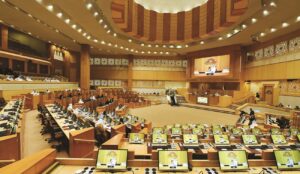Bulgaria Approves Sweeping Education Reforms: Mobile Phone Ban, Language Support, and Values-Based Curriculum Introduced

Sofia, The Gulf Observer: The Bulgarian government has approved comprehensive amendments to the Preschool and School Education Act, signaling a major overhaul of the national education system. Spearheaded by the Ministry of Education and Science, the reform package is now set to be presented to the National Assembly for deliberation.
The proposed changes aim to modernize the education system, improve discipline, promote national values, enhance access and inclusion, and strengthen student-teacher support mechanisms across the country.
A headline measure in the reform is the nationwide ban on mobile phones in schools, with exceptions only for educational or medical use, or emergencies. This decision stems from growing evidence that electronic devices hinder concentration, academic performance, and the development of key cognitive and emotional skills among students.
In an effort to bolster inclusivity, the amendments introduce targeted Bulgarian language programs for students lacking fluency, particularly children returning from abroad. For grades 1 to 7, accelerated language learning programs will be offered alongside regular coursework, while children with no prior knowledge of Bulgarian will receive special preparatory classes. First grade repetition will be permitted where necessary to ensure successful language acquisition.
Further reforms focus on supporting gifted students in STEM fields. New mathematics and natural sciences high schools will be created, enrolling students directly after 4th grade. Existing specialized schools will be reclassified accordingly, and students will be allowed to remain in these institutions through high school without reapplying after grade 7.
To improve discipline and ensure early intervention in behavioral issues, teachers’ authority will be expanded, allowing for a wider range of corrective measures while maintaining supportive legal frameworks for students.
An innovative addition is the introduction of a mandatory elective subject on moral education and values. Students and parents will select from three thematic programs designed to cultivate empathy, integrity, courage, and compassion. Though religion will be part of the discussion, it will not be compulsory, and no formal grades will be assigned. The focus will be on dialogue and personal development rather than memorization.
The reforms also significantly expand support for children with special educational needs. Daily transportation will be funded for those attending specialized centers, which will now accept students up to grade 12—an increase from the current age limit of 16. These students will be able to validate acquired competencies and access expanded extracurricular and rehabilitative programs. The process of issuing diplomas and planning individualized educational pathways is also being streamlined, with an emphasis on parent involvement and expert evaluation.
A major shift is underway in student and teacher assessment models. Traditional rote learning will give way to skills-based evaluations focusing on real-world problem solving, critical thinking, and emotional intelligence. Meanwhile, the current teacher attestation system will be replaced by annual performance reviews, serving as tools for motivation, promotion, or, if necessary, disciplinary action.
Two new professional designations—basic teachers (who will mentor future educators) and subject-specific methodologists (who will provide local peer support)—are being introduced. Annual teacher training will become mandatory, with flexible, competency-based learning formats. A national information system will monitor these qualifications and link them directly to professional growth.
Overall, the ambitious legislative package represents a transformative moment for Bulgaria’s education system, striving to prepare students for modern challenges while preserving inclusivity, values, and academic excellence.


